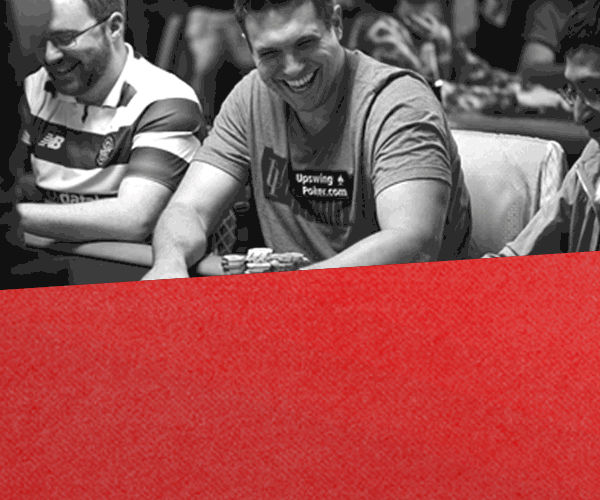Does Your Poker Journey Feel Stuck? So Did Doug Polk’s
Does your poker career feel stuck? Have you been playing in the same low- and mid-stakes games for what seems like forever, but now feel that your once-achievable poker goals are just pipe dreams? Do you feel like your love for the game keeps you playing, but that it’s ultimately pointless?
You are not the only one.
Doug Polk was feeling the same way about his poker journey back in 2007, before his online success and WSOP bracelets. Desperate for help, he posted on TwoPlusTwo:
You can read the original thread in its entirety here.
Feeling stuck is a problem that plagues a ton of aspiring poker pros, and how you choose to handle it may make or break your poker career.
Over the next ten years, Doug chose to rededicate himself to the game he loved. His newfound commitment to improvement helped him rise through the stakes and become one of the most successful players around today. For him, it was this post that marked a turning point in his journey.
So, how can you turn your poker journey around?
1. Work to improve your game every day
You should always be on the lookout for ways to improve your game. I’ve met a number of players who felt confident enough about their skills to quit studying poker strategy altogether — they figured it was just a matter of grinding out the volume until the winnings came in.
This line of thinking is flawed. Poker is not a solved game; not even computers have it completely figured out. There is not a player in the world who has truly learned all they need to know about poker strategy.
The best players in the world demonstrate a strong willingness to learn, even after achieving success.
There are countless ways to improve your game, such as chatting with poker-playing friends, running simulations, or observing the plays you witness at the table.
Relevant ‘Poker Tip of the Day’ from Doug’s Instagram
Set yourself a goal to learn something new about poker every day. Achieve that goal by approaching your game objectively, being self-critical, and welcoming advice from other players and learning sources.
2. Take bankroll management seriously
In a game where you need money in order to make money, busting your entire bankroll is a complete disaster. It is imperative that you stay responsible and smart when it comes to bankroll management.
Poker is a game of variance, so you need to play at limits where your bankroll – and your emotions – can handle the swings. Specifically:
- Cash game players should have around 50 buy-ins for their chosen game
- Tournament players should have 250–500 of their average buy-in
These are estimates—the proper bankroll varies based on the specific game you’re playing. The higher the variance of your chosen game, the more buy-ins you need (for example, you need more than 500 buy-ins for turbo tournaments).
Move the egos aside. If you have to play $1 tournaments to stay within your limits, there is absolutely no shame in doing so. The bigger games will still be there when your bankroll is ready.
Poker is a marathon, not a sprint.
(Note: If you’re enjoying this look into the Upswing Lab, why not check out the whole thing for yourself? Learn more about the Lab and check out Doug Polk’s video walk through by clicking HERE or below.)

3. Work hard away from the table
You need to work very hard to reach the top of the poker world.
For the truly committed, this means playing, studying, watching, talking, living and breathing poker. These are the ways in which Doug dedicated himself to achieve his dreams, and you must do the same if you are serious about a future in this game.
Surrounding yourself with like-minded people is a great way to improve, and to help others improve as well.
If you play live poker, try being friendly with some of the other regulars. Talk about hands, and bounce ideas off of each other, but make sure you do it away from the table where your opponents can’t hear!
If you’re an online player, consider joining a study group with players around your skill level. Doug swears by Skype study groups, as they were the main source of many of his poker revelations.
Almost everybody prefers playing poker to studying, but doing the latter will make the former a much more profitable and enjoyable experience. After learning a new concept and effectively applying it at the poker table, you’ll feel much more confident about your game.
4. Keep your head up
Downswings can feel endless. Losing weeks can turn into losing months, and potentially years. Before long, you can barely remember what it feels like to book a win.
You have to learn to compartmentalize these downswings if you want to last in poker. It is much harder to play your best poker when a big losing session weighs heavy on your mind.
Instead of dwelling on the past, focus on the present and making good strategic decisions that you can be proud of. There’s no reason to beat yourself up when you in fact made a good decision, even if the chips ultimately didn’t go your way.
Keep your head up, stay positive and it’ll only be a matter of time before you’re back on an upswing.
5. Focus on one game type
It can be tempting for a tournament player to hop in a high stakes cash game to try to get unstuck, just like it can be tempting for a cash game player to fire a bunch of tournaments on Sunday. This is fine if you’re a successful and confident player, but struggling players need to stay laser-focused on their chosen game type.
Most players who find huge success in poker focus on a single game type. Consider these guys, who have all been considered the best at their game type:
- Doug Polk: Focused on heads-up. Eventually, not a single player in the world would face him
- OtB_RedBaron: Focuses on 6-max cash games and consistently books the biggest years of any 6-max player
- Phil Hellmuth: Plays the WSOP and similar made-for-television events almost exclusively. His results speak for themselves (see: How Good is Phil Hellmuth Really?)
That’s just to name a few. Pretty good company, imo.
Doug’s Poker Journey to Un-Stuck
If there’s anything we can learn from Doug’s story, it’s that motivation and dedication pay off in the long run. Have a look at the timeline of his career since that TwoPlusTwo post from back in 2007:
- 2007-2012: Doug gradually climbed his way up the stakes playing online, transitioning to become a heads-up specialist along the way. Bouncing back from a brutal downswing, which included Black Friday in 2011, a very profitable 2012 led to him becoming regarded as one of the best heads-up players in the game.
- 2013: Doug beat Ben “Sauce123” Sulsky in a 50,000 hands heads-up challenge. He walked away with $740,000, in addition to a $100,000 side bet.
- 2014: Doug has a breakout year for live tournaments, with total winnings of over $3 million. His success included his first WSOP bracelet win, a super-high roller event win for $1.65 million, and a deep run at the Aussie Millions for $770,000
- 2015: Doug led a team of heads-up specialists to victory over poker bot Claudico in the first ‘Brains vs AI’ challenge. The team received $100,000 for their accomplishment. This year also marked the birth of Upswing Poker.
- 2016: Doug partnered up with Upswing co-founder Ryan Fee to win his second WSOP bracelet in the Tag Team event. Along with this live success, he took down the PokerStars Kilimanjaro event for $162,000 whilst streaming it on Twitch—a record for the most money ever won on stream. To top it off, Doug shipped his first ever SCOOP title in May with a $115,000 win.
- 2017: Doug set another streaming record, this time on YouTube, winning $271,272 in a $5,200 buy-in tournament on PartyPoker. He followed that up with a win in the prestigious $111,111 One Drop event for $3.6 million and his third WSOP bracelet.
If you demonstrate a drive for success like Doug did, it could be you winning all of the WSOP bracelets in a couple of years.
(Note: You can learn poker the right way, from A-to-Z, with help from world class players in The Poker Lab. Click here or below to learn more.) 
Read more from Upswing Poker:
- Make sure you don’t believe any of these 5 Tournament Myths Way Too Many Players Believe
- A game theory expert makes a guest appearance to explain Why You Should Use More Small Bet Sizes
- Learn how to defend your big blind in cash games AND tournaments with this extensive article